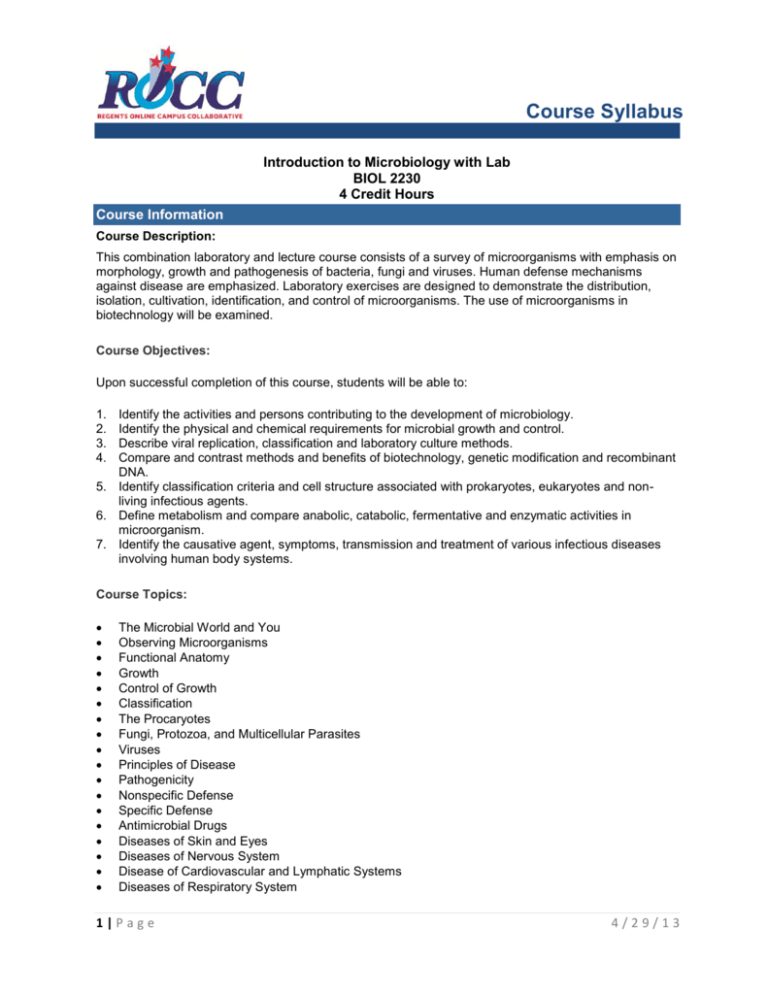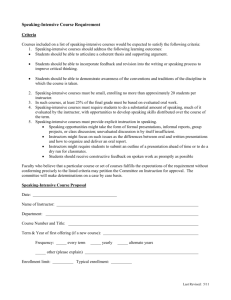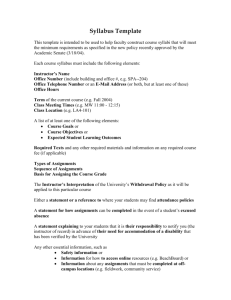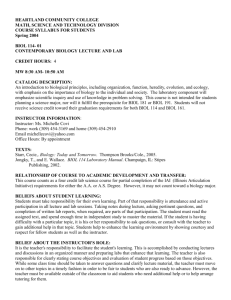Course Syllabus - Regents Online
advertisement

Course Syllabus Introduction to Microbiology with Lab BIOL 2230 4 Credit Hours Course Information Course Description: This combination laboratory and lecture course consists of a survey of microorganisms with emphasis on morphology, growth and pathogenesis of bacteria, fungi and viruses. Human defense mechanisms against disease are emphasized. Laboratory exercises are designed to demonstrate the distribution, isolation, cultivation, identification, and control of microorganisms. The use of microorganisms in biotechnology will be examined. Course Objectives: Upon successful completion of this course, students will be able to: 1. 2. 3. 4. Identify the activities and persons contributing to the development of microbiology. Identify the physical and chemical requirements for microbial growth and control. Describe viral replication, classification and laboratory culture methods. Compare and contrast methods and benefits of biotechnology, genetic modification and recombinant DNA. 5. Identify classification criteria and cell structure associated with prokaryotes, eukaryotes and nonliving infectious agents. 6. Define metabolism and compare anabolic, catabolic, fermentative and enzymatic activities in microorganism. 7. Identify the causative agent, symptoms, transmission and treatment of various infectious diseases involving human body systems. Course Topics: The Microbial World and You Observing Microorganisms Functional Anatomy Growth Control of Growth Classification The Procaryotes Fungi, Protozoa, and Multicellular Parasites Viruses Principles of Disease Pathogenicity Nonspecific Defense Specific Defense Antimicrobial Drugs Diseases of Skin and Eyes Diseases of Nervous System Disease of Cardiovascular and Lymphatic Systems Diseases of Respiratory System 1|Page 4/29/13 Course Syllabus Diseases of Digestive System, Urinary and Reproductive Systems Prerequisites and Corequisites: None. However, the following guidelines should be used when signing up for the following courses: Human Anatomy and Physiology (BIOL 2010 and BIOL 2020) or Microbiology (BIOL 2230): Biology 2010 has no prerequisites. BIOL 2010 and 2020 may not be taken in the same semester since passing BIOL 2010 with a grade of D or better is required for taking BIOL 2020. Biology 2230 has no prerequisites and may be taken concurrently with BIOL 2010 or BIOL 2020. However, it is strongly recommended that students take no more than one of these courses (BIOL 2010, BIOL 2020, or BIOL 2230) in a given semester. Textbooks, Supplementary Materials, Hardware and Software Requirements Required Textbooks: Visit the RODP Bookstore at http://rodp.bkstr.com for textbook information. Choice 1: Microbiology EBook Access Card Choice 2: MICROBIOLOGY BUNDLE (Text, Current Issues, Ebook) Bundle Each student will need Virtual Unknown Microbiology Student Laboratory software. (Note that a Mac version is available. Contact your instructor for details. The A&P and Microbiology Study disk is also needed. Supplementary Materials: See software requirements. Hardware Requirements: The minimum requirements can be found at http://www.rodp.org/current-students/technical-support. Software Requirements: The minimum requirements can be found at http://www.rodp.org/current-students/technical-support. Additional requirements include: Microsoft Office Word, Acrobat Reader, Shockwave and PowerPoint. Note: The Virtual Laboratory Disk which is used for 3 assignments, does not run well on a MAC. Web Resources: The Everyday Writer The Writing Center Online Writers Handbook 2|Page 4/29/13 Course Syllabus Instructor Information Please see the separate page inside the course to find instructor contact information as well as a statement of virtual office hours and other communication information. A student can expect to receive a response from the instructor within 24-48 hours of a student's email to the instructor unless notified of extenuating circumstances. Participation, Assessments and Grading Testing Procedures: Testing will be done online during a specified time period. A laboratory test at midterm and the final examination will be proctored. No makeups of proctored tests are allowed. Grading Procedures: A student’s grade will be determined from a total of points obtained from 4 sources: (1) laboratory tests; (2) lecture tests and final examination; (3) laboratory work; (4) assignments. Grading Scale Point Range Assigned Grade 1260-1400 Points A 1120-1259 Points B 980-1119 Points C 840-979 Points D under 840 Points F Assignments and Projects: Module Tests Laboratory Tests Virtual Unknowns Virtual Unknown Exercises Quizzes Laboratory Assignments: Cell Structure, Parasites and Fungi, Take Home Test Final Examination 3|Page 4/29/13 Course Syllabus Graded Assignments Assignment name Number of Assignments Points Module Tests 5@ 100 pts. ea. 500 Laboratory Tests 2 @ 100 pts. ea. 200 Laboratory Quizzes 1 @ 50 pts; 1 @ 100 pts. 150 Virtual Unknown 3 @ 50 pts. ea. 150 Identifications 3 at 10 points ea. 100 Virtual Unknown Assignments 2 at 25 Points each 1 at 20 points Total Virtual Unknown 250 Points Take Home Test 1 @ 100 pts. 100 Final Examination 1@ 200 pts. 200 Total Points 1400 Class Participation: You are expected to participate in all interactive aspects of the course. For example, you must communicate with other students via emails and discussion board exchanges. You are expected to communicate with your instructor on a regular basis and check the course frequently for announcements. You must actively participate in threaded discussion events. Students are expected to work at a pace conducive to collaborative learning - that is, don't work too far ahead or too far behind the group. The class is designed to support student interaction. You will be responsible for meeting all deadlines. Punctuality: You are encouraged to work at your own pace, However, deadlines are placed on threaded discussions, quizzes and tests and assignments. You should become familiar with the Class Calendar to determine when materials are due and adjust your study schedule accordingly. Once a deadline has passed you will be "locked out" of the material. 4|Page 4/29/13 Course Syllabus Course Ground Rules The following two statements (1., 2.) were derived from the TBR System-wide Student Rules document, released January 2012: RULES OF THE TENNESSEE BOARD OF REGENTS STATE UNIVERSITY AND COMMUNITY COLLEGE SYSTEM OF TENNESSEE SYSTEMWIDE STUDENT RULES CHAPTER 0240-02-03 STUDENT CONDUCT AND DISCIPLINARY SANCTIONS Read the document in its entirety here . 1. Standards of Conduct: Students are required to adhere to the same professional, legal and ethical standards of conduct online as on campus. In addition, students should conform to generally accepted standards of "netiquette" while sending e-mail, posting comments to the discussion board, and while participating in other means of communicating online. Specifically, students should refrain from inappropriate and/or offensive language, comments and actions. Academic Integrity/Academic Honesty: In their academic activities, students are expected to maintain high standards of honesty and integrity. Academic dishonesty is prohibited. Such conduct includes, but is not limited to: an attempt by one or more students to use unauthorized information in the taking of an exam, to submit as one's own work, themes, reports, drawings, laboratory notes, computer programs, or other products prepared by another person, or to knowingly assist another student in obtaining or using unauthorized materials. Plagiarism, cheating, and other forms of academic dishonesty are prohibited. Plagiarism – All assignments you submit in this course must be your own original work. If you borrow ideas from books, journals, magazines, or newspapers, you must give credit to the original source. Please ask me how to document our two textbooks using the APA format correctly. Plagiarism could result in an F in the course. Students guilty of academic misconduct, either directly or indirectly through participation or assistance, are subject to disciplinary action through the regular procedures of the student’s home institution. In addition to other possible disciplinary sanctions that may be imposed, the instructor has the authority to assign an "F" or zero for an activity or to assign an "F" for the course. Read more about how to 5|Page 4/29/13 Course Syllabus Avoid Plagiarism. Students guilty of academic misconduct, either directly or indirectly through participation or assistance, are subject to disciplinary action through the regular procedures of the student’s home institution. Start here to find your institution's policy on student conduct. In addition to other possible disciplinary sanctions that may be imposed, the instructor has the authority to assign an "F" or zero for an activity or to assign an "F" for the course. Exam Policy: ALL exams are to be taken at times scheduled by the instructor. Exact dates for each assignment are posted on the course calendar. It is essential that you do all assignments, quizzes, tests, etc. in a timely manner. Late assignments will lose 10 points per calendar day that they are overdue. No make ups of proctored laboratory test at midterm and the Final Examination are allowed. A proctor at a site other than a TBR testing center must meet the following criteria: The request and proctor information must be submitted to your instructor 3 weeks before the beginning of the proctoring period. Absolutely No approval of proctors will occur during the test week unless there is an emergency or some unusual circumstance such as inclement weather. The proctor must be approved by your instructor, the course developer, and the Walters State Academic Dean The proctor must be associated with an accredited college or professional school and cannot be your instructor for another class, your coach, tutor, family member or friend. Make-up exams will be given for excused absences only (excused absences include serious illness, death in immediate family, and military or jury duty). Makeup exams will be different from exams taken at scheduled times and will require documentation of the problem causing the missed test. Should a makeup be allowed, tests must be taken before the next scheduled test. If you fail to make up a test before the next scheduled test, you must obtain permission from the Walters State Academic Dean in order to make up the test. No makeup tests may be taken or assignments submitted after the last day of class. Guidelines for Communications Always include a subject line. Remember without facial expressions some comments may be taken the wrong way. Be careful in wording your emails. Use of emoticons might be helpful in some cases. Use standard fonts. Do not send large attachments without permission. Special formatting such as centering, audio messages, tables, html, etc. should be avoided unless necessary to complete an assignment or other communication. 6|Page 4/29/13 Course Syllabus Respect the privacy of other class members. . Discussions: Review the discussion threads thoroughly before entering the discussion. Be a lurker then a discussant. Try to maintain threads by using the "Reply" button rather starting a new topic. Do not make insulting or inflammatory statements to other members of the discussion group. Be respectful of other's ideas. Be patient and read the comments of other group members thoroughly before entering your remarks. Be cooperative with group leaders in completing assigned tasks. Be positive and constructive in group discussions. Respond to discussion topics or questions in a thoughtful, helpful timely and thorough manner. Library The Tennessee Virtual Library is available to all students enrolled in the Regents Degree Program. Links to library materials (such as electronic journals, databases, interlibrary loans, digital reserves, dictionaries, encyclopedias, maps, and librarian support) and Internet resources needed by learners to complete online assignments and as background reading must be included in all courses. Students With Disabilities Qualified students with disabilities will be provided reasonable and necessary academic accommodations if determined eligible by the appropriate disability services staff at their home institution. Prior to granting disability accommodations in this course, the instructor must receive written verification of a student's eligibility for specific accommodations from the disability services staff at the home institution. It is the student's responsibility to initiate contact with their home institution's disability services staff and to follow the established procedures for having the accommodation notice sent to the instructor. Syllabus Changes The instructor reserves the right to make changes as necessary to this syllabus. If changes are necessitated during the term of the course, the instructor will immediately notify students of such changes both by individual email communication and posting both notification and nature of change(s) on the course bulletin board. Technical Support Please visit the "Get Help" page in the Getting Started Module of this course to find technical support information. If you are having problems logging into your course, timing out of your course, using your course web site tools, or other technical problems, please contact the Help Desk by calling: 1-866-550-7637 7|Page 4/29/13








